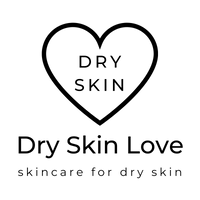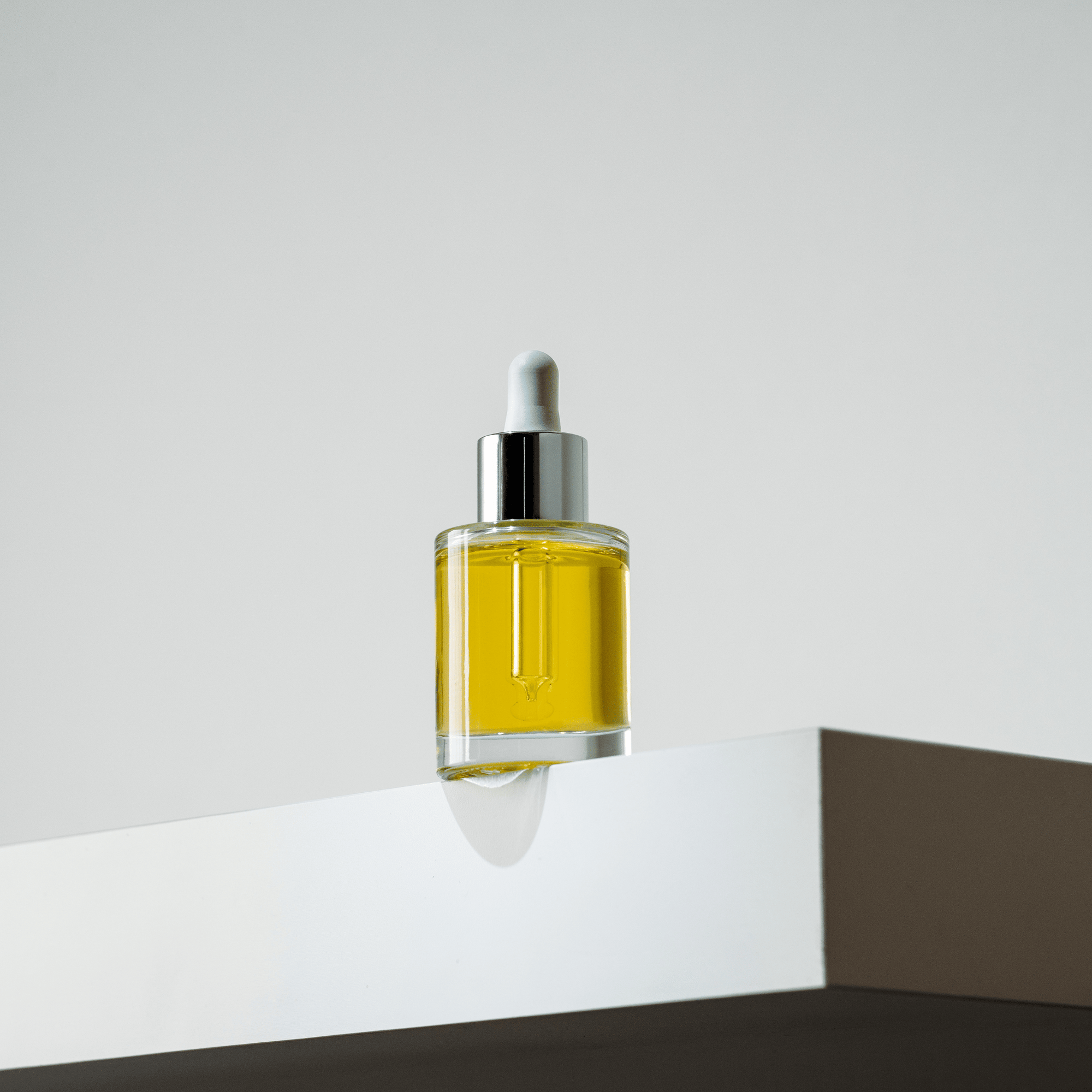A face oil is an oil-based skincare product that can improve your dry skin.
Face oils have many benefits for your dry skin, they can soften your skin, improve the texture of your skin, reduce fine lines, calm redness and irritation, brighten skin and protect your skin from daily damage.
Face oils can give your dry skin a healthy, youthful glow.
This article will discuss:
- What is a face oil?
- What are the active nutrients in a face oil?
- What are the benefits of face oils?
- Face oils infuse your skin with nutrients
- Face oils soften and condition your skin
- Face oils strengthen your skin barrier
- Face oils calm your skin
- Face oils protect your skin
- Summary
- References

What is a face oil?
A face oil is an oil-based skincare product that can soften, condition and soothe your dry skin.
A face oil is made from plant-based oils, and may also include mineral oils, animal-based oils, and/or esters.
A simple face oil may be composed of a single plant oil, whereas a more complex face oil may contain several plant oils, as well as extracts, actives and essential oils.
Some plant oils in face oils may include:
Different plant oils have different properties, including textures, aromas, colors, skin feel, nutrient profiles and benefits.
There are face oils that are created for different skin types and concerns, including dry skin, mature skin, sensitive skin or acne prone skin.
Learn more: What is a Face Oil?
What are the active nutrients in face oils?
Face oils that contain plant oils are rich in active nutrients including fatty acids, squalene, vitamins, phytosterols, polyphenols and other bioactive compounds that have benefits for your skin.
The active nutrients of face oils may include:
- Fatty acids
- Lecithin
- Squalene
- Ceramides
- Vitamin E - tocopherols and tocotrienols
- Vitamin K - phylloquinone
- Carotenoids
- Phytosterols
- Polyphenols
The amounts of nutrients in plant oils depends on how the plants were extracted and processed. Unrefined and cold-pressed plant oils contain the highest amount of active nutrients.
Learn more: Face Oils Contain Active Nutrients

What are the benefits of face oils?
Face oils have many benefits for your skin, they can infuse your skin with essential nutrients, soften and condition your skin, strengthen your skin's moisture barrier, calm irritation and protect your skin from daily damage.
There are 5 key benefits of face oils:
- Face oils infuse your skin with nutrients
- Face oils soften and condition your skin
- Face oils strengthen your skin barrier
- Face oils calm your skin
- Face oils protect your skin
Face oils can have many benefits for your skin depending on their formulation.

1. Face oils infuse your skin with nutrients
As you age, your skin barrier becomes weaker.
Your skin makes less lipids, fatty acids, vitamins and antioxidants.
Learn more: How Does Aging Change Your Skin?
Studies have shown that the aged skin barrier has a >30% drop in total lipid content in comparison to young skin barrier, due to reduced lipid synthesis in the aging skin (Ghadially et al, 1995; Ghadially et al, 1996).
Aging skin also has less fatty acids. Compared to young skin, aging skin had less short chain fatty acids such as stearic acid (31% lower) and palmitic acid (15% lower) and less omega-6 fatty acid linoleic acid (7% lower) (Kim et al, 2010).
The amount of vitamins and antioxidants in your lipid barrier also drop as you age.
The concentration of vitamin E and ubiquinone (coenzyme Q10), which together with squalene, play a key role against external oxidative insult, have all been shown to decrease significantly in aging skin (Passi et al, 2003).
Specifically, as you age, your skin makes less:
- lipids
- stearic acid
- palmitic acid
- linoleic acid (n-6)
- vitamin E
- squalene
- ubiquinone (coenzyme Q10)
Fortunately, these beneficial nutrients can be found in plant carrier oils.
Plant carrier oils be extracted from nuts, grains, seeds, fruit and berries.
Face oils that contain plant carrier oils are rich in fatty acids, squalene, vitamins and other bioactive compounds.
Face oils rich in plant carrier oils can infuse your skin with essential nutrients.
Learn more: Face Oils contain Active Nutrients

2. Face oils soften and condition your skin
Face oils are emollients and function as skin conditioning agents.
The function of emollients in skincare is to soften the skin, help the skin retain its moisture and to support the skin’s barrier function.
Skin that does not have sufficient lipid content on its surface can appear dull, dry and rough. Emollients "fill in the gaps" in the skin barrier and soften it along with giving it a healthier look.
The role of emollients in the treatment of dry skin conditions is often underestimated. Emollients promote optimal skin health and prevent skin breakdown, and their use can improve quality of life.
Emollients are skin conditioning – the give skin a soft and smooth appearance, restoring suppleness and improving elasticity.
Emollients reduce the appearance of fine lines and wrinkles for plumper looking skin.
Face oils can help to improve the skin's moisture retention, enhance its natural barrier function, and support the overall health and appearance of the skin.
Emollients:
- Make your skin feel soft and smooth.
- Help reduce flaking and roughness from dry skin.
- Help assist the skin barrier by filling in gaps between cells.
Learn more: Benefits of Emollients for Dry Skin

3. Face oils strengthen your skin's moisture barrier
Face oils that are rich in plant carrier oils can strengthen your skin's moisture barrier.
Many plant carrier oils are rich in fatty acids that are found naturally in the protective outer layer of the skin, including oleic acid (n-9), linoleic acid (n-6), palmitic acid and stearic acid.
Learn more: Beneficial Fats Found Naturally in Your Skin Barrier
Oleic acid
Oleic acid has many benefits for dry skin when applied topically. It is quickly absorbed and softens dry skin.
Plant oils rich is oleic acid include olive oil, macadamia nut oil and apple see oil.
Linoleic acid
Linoleic acid has many benefits for your skin when applied topically. It softens your skin and strengthens your skin barrier.
Linoleic acid can:
- Make your skin feel soft and smooth
- Help reduce flaking and roughness from dry skin
- Minimize the appearance of fine lines and wrinkles
- Reduce irritation from dry skin
- Relieve itching from dry skin
Linoleic acid is a precursor for ceramides (Breiden et al, 2014), which are bioactive lipids that play a role in keeping our skin barrier firm, smooth and healthy.
Linoleic acid is an essential fatty acid and it cannot be made by your body. It must be supplied through diet, supplements and skincare.
High sources of linoleic acid include sunflower seed oil, soybean oil and hemp seed oil.
Learn more: What is Linoleic Acid? Omega 6 Essential Fatty Acid for Dry Skin
Palmitic acid
Palmitic acid is a saturated fatty acid. Saturated fats tend to be solid at room temperature (like coconut oil and butter).
Palmitic acid is a rich emollient as well as an occlusive agent, meaning it locks moisture into your skin rather than letting it evaporate.
Rich sources of palmitic acid are palm oil, cocoa butter, coconut oil and argan oil.
Stearic acid
Stearic acid is also a saturated fatty acid. Like palmitic acid, it’s very rich and forms an occlusive layer over the skin.
Natural sources of stearic acid are cocoa butter, shea butter and argan oil.

4. Face oils calm your skin
Face oils that are rich in plant carrier oils can calm redness and irritation.
Carrier oils are emollients, which are skin soothing.
Emollients are the first-line therapy for the treatment of skin related irritation and itch (Moncrieff et al, 2013).
The best face oils for redness and irritation contain plant carrier oils that are rich in anti-inflammatory compounds including fatty acids, vitamins, polyphenols and phytosterols.
Fatty acids such as oleic acid (omega 9), alpha-linolenic acid (omega 3) and gamma-linolenic acid (omega 6) all have anti-inflammatory activity.
Oleic acid
Oleic acid has anti-inflammatory properties (Santa-Maria et al, 2023), which can help calm and soothe irritated or inflamed skin.
Interestingly, oleic acid can also inhibit TRPV1, a receptor that plays a role in itch and pain responses (Morales-Lázaro et al, 2016).
Plant oils rich is oleic acid include camellia seed oil, avocado oil and apple see oil.
Plant oils rich is oleic acid include camellia seed oil, avocado oil and apple see oil.
Alpha-linolenic acid
Alpha-linolenic acid is an essential omega 3 fatty acid that calms redness and irritation (McCusker et al, 2010).
High sources of alpha-linolenic acid (n-3) include strawberry seed oil, blueberry seed oil and blackberry seed oil.
Gamma-linolenic acid
Gamma-linolenic acid is an omega-6 fatty acid that is known for its potential anti-inflammatory and skin-supporting properties (Kapoor et al, 2006).
Rich sources of gamma-linolenic acid (n-6) include evening primrose oil, borage oil, black currant seed oil and hemp seed oil.
Vitamin E
Vitamin E tocopherols and tocotrienols also have anti-inflammatory activity.
Vitamin E tocopherols including alpha-tocopherol, gamma-tocopherol and delta-tocopherol have anti-inflammatory activity, as well as gamma-tocotrienol (Reiter et al, 2007; Jiang et al, 2014; Jiang et al, 2022).
Plant carrier oils rich in vitamin E include soy oil, sunflower oil and rice bran oil.
Polyphenols
Polyphenols are plant compounds with anti-inflammatory activity.
They can help protect the skin from damage caused by UV radiation and other environmental factors (Adamska-Szewczyk et al, 2019).
Plant oils high in polyphenols include olive oil, grape seed oil, hemp seed oil and apple seed oil.
Phytosterols
Phytosterols are plant-derived sterols similar to cholesterol.
Phytosterols such as sitosterol are potent antioxidants and anti-inflammatory compounds (Bakrim et al, 2022).
Rich sources of phytosterols include rice bran oil, soybean oil and apple seed oil.

5. Face oils protect your skin
Face oils that are rich in antioxidants protect your skin from environmental damage such as UV damage from sunlight exposure and pollution.
Antioxidants protect your skin
Antioxidants protect your skin by preventing free radical damage.
Free radicals are unstable molecules or atoms that can damage skin cells.
Free radicals are generated from normal aging, and by daily environmental damage - such as UV radiation from the sun and air pollution. Free radicals cause destruction to your cells and tissues, and accelerate skin aging (Masaki et al, 2010).
Antioxidants protect your skin by neutralizing unstable free radicals.
What is oxidative stress?
Your skin is susceptible to oxidative stress due to UV radiation from the sun and air pollution.
Oxidative stress occurs when the number of pro-oxidant species exceeds the number of antioxidant species.
For the skin, the consequences of this imbalance include inflammation, phototoxicity and accelerated aging (Trouba et al, 2002; Pinnell et al, 2003).
Plant carrier oils are rich in powerful antioxidants including vitamin E, polyphenols and phytosterols that can protect your skin from stress, damage and premature aging.

Summary
A face oil is made from plant-based oils, and may also include mineral oils, animal-based oils, and/or esters.
A simple face oil may be composed of a single plant oil, whereas a more complex face oil may contain several plant oils, as well as extracts, actives and essential oils.
Face oils have many benefits for your skin depending on their formulation.
Face oils can soften your skin, improve the texture of your skin, reduce fine lines, calm redness and irritation and protect your skin from daily damage.
Face oils are great for all skin types, but especially dry skin.

References
Adamska-Szewczyk A, Zgórka G. Plant polyphenols in cosmetics–a review. EJMT. 2019;3:24.
Bakrim S, Benkhaira N, Bourais I, Benali T, Lee LH, El Omari N, Sheikh RA, Goh KW, Ming LC, Bouyahya A. Health Benefits and Pharmacological Properties of Stigmasterol. Antioxidants (Basel). 2022 Sep 27;11(10):1912.
Breiden B., Sandhoff K. The role of sphingolipid metabolism in cutaneous permeability barrier formation. Biochim. Biophys. Acta. 2014;1841:441–452.
Ghadially R, Brown BE, Sequeira-Martin SM, Feingold KR, Elias PM. The aged epidermal permeability barrier. Structural, functional, and lipid biochemical abnormalities in humans and a senescent murine model. J Clin Invest. 1995; 95:2281–90.
Ghadially R, Brown BE, Hanley K, Reed JT, Feingold KR, Elias PM. Decreased epidermal lipid synthesis accounts for altered barrier function in aged mice. J Invest Dermatol. 1996; 106:1064–69.
Jiang Q. Natural forms of vitamin E: metabolism, antioxidant, and anti-inflammatory activities and their role in disease prevention and therapy. Free Radic Biol Med. 2014 Jul;72:76-90.
Jiang Q, Im S, Wagner JG, Hernandez ML, Peden DB. Gamma-tocopherol, a major form of vitamin E in diets: Insights into antioxidant and anti-inflammatory effects, mechanisms, and roles in disease management. Free Radic Biol Med. 2022 Jan;178:347-359.
Kapoor R, Huang YS. Gamma linolenic acid: an antiinflammatory omega-6 fatty acid. Curr Pharm Biotechnol. 2006 Dec;7(6):531-4.
Kim EJ, Kim MK, Jin XJ, Oh JH, Kim JE, Chung JH. Skin aging and photoaging alter fatty acids composition, including 11,14,17-eicosatrienoic acid, in the epidermis of human skin. J Korean Med Sci. 2010 Jun;25(6):980-3.
Kim EJ, Jin XJ, Kim YK, Oh IK, Kim JE, Park CH, Chung JH. UV decreases the synthesis of free fatty acids and triglycerides in the epidermis of human skin in vivo, contributing to development of skin photoaging. J Dermatol Sci. 2010 Jan;57(1):19-26.
Masaki H. Role of antioxidants in the skin: anti-aging effects. J Dermatol Sci. 2010 May;58(2):85-90.
McCusker, et al. Healing fats of the skin: the structural and immunologic roles of the omega-6 and omega-3 fatty acids. Clin Dermatol. 2010 Jul-Aug;28(4):440-51.
Moncrieff G, Cork M, Lawton S, Kokiet S, Daly C, Clark C. Use of emollients in dry-skin conditions: consensus statement. Clin Exp Dermatol. 2013 Apr;38(3):231-8; quiz 238.
Morales-Lázaro SL, Llorente I, Sierra-Ramírez F, López-Romero AE, Ortíz-Rentería M, Serrano-Flores B, Simon SA, Islas LD, Rosenbaum T. Inhibition of TRPV1 channels by a naturally occurring omega-9 fatty acid reduces pain and itch. Nat Commun. 2016 Oct 10;7:13092.
Passi S, De Pità O, Grandinetti M, Simotti C, Littarru GP. The combined use of oral and topical lipophilic antioxidants increases their levels both in sebum and stratum corneum. Biofactors. 2003;18(1-4):289-97.
Reiter E, Jiang Q, Christen S. Anti-inflammatory properties of alpha- and gamma-tocopherol. Mol Aspects Med. 2007 Oct-Dec;28(5-6):668-91.
Santa-María C, López-Enríquez S, Montserrat-de la Paz S, Geniz I, Reyes-Quiroz ME, Moreno M, Palomares F, Sobrino F, Alba G. Update on Anti-Inflammatory Molecular Mechanisms Induced by Oleic Acid. Nutrients. 2023 Jan 1;15(1):224.
Pinnell SR. Cutaneous photodamage, oxidative stress, and topical antioxidant protection. J Am Acad Dermatol. 2003 Jan;48(1):1-19; quiz 20-2.
Trouba KJ, Hamadeh HK, Amin RP, Germolec DR. Oxidative stress and its role in skin disease. Antioxid Redox Signal. 2002 Aug;4(4):665-73.
Zettersten EM, Ghadially R, Feingold KR, Crumrine D, Elias PM. Optimal ratios of topical stratum corneum lipids improve barrier recovery in chronologically aged skin. J Am Acad Dermatol. 1997; 37:403–08.
Author Information

Dr. Natasha Ryz is a scientist, skin care expert and an entrepreneur. She is the founder of Dry Skin Love Skincare, and she creates skincare products for beauty, dry skin and pain relief.
Dr. Ryz has a PhD in Experimental Medicine from the University of British Columbia in Vancouver, and she is a Vanier scholar. She also holds a Master of Science degree and a Bachelor of Science degree from the University of Manitoba in Winnipeg.
Natasha is the former Chief Science Officer of Zenabis Global, and she oversaw extraction, analytics, and product development. Her team brought 20 products to market including oils, sprays, vapes and softgels.
Why I Started A Skincare Company


